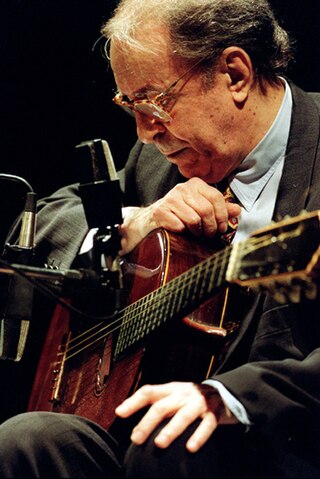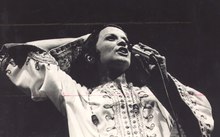
The music of Brazil encompasses various regional musical styles influenced by European, American, African and Amerindian forms. Brazilian music developed some unique and original styles such as forró, repente, coco de roda, axé, sertanejo, samba, bossa nova, MPB, gaucho music, pagode, tropicália, choro, maracatu, embolada, frevo, brega, modinha and Brazilian versions of foreign musical styles, such as rock, pop music, soul, hip-hop, disco music, country music, ambient, industrial and psychedelic music, rap, classical music, fado, and gospel.

Bossa nova is a relaxed style of samba developed in the late 1950s and early 1960s in Rio de Janeiro, Brazil. It is mainly characterized by a calm syncopated rhythm with chords and fingerstyle mimicking the beat of a samba groove, as if it was a simplification and stylization on the guitar of the rhythm produced by a samba school band. Another defining characteristic of the style is the use of unconventional chords in some cases with complex progressions and "ambiguous" harmonies. A common misconception is that these complex chords and harmonies were derived from jazz, but samba guitar players have been using similar arrangement structures since the early 1920s, indicating a case of parallel evolution of styles rather than a simple transference from jazz to bossa nova. Nevertheless, bossa nova was influenced by jazz, both in the harmonies used and also by the instrumentation of songs, and today many bossa nova songs are considered jazz standards. The popularity of bossa nova has helped to renew samba and contributed to the modernization of Brazilian music in general.

Antônio Carlos Brasileiro de Almeida Jobim, also known as Tom Jobim, was a Brazilian composer, pianist, guitarist, songwriter, arranger, and singer. Considered as one of the great exponents of Brazilian music, Jobim merged Samba with Cool jazz in the 1960s to create Bossa nova, with worldwide success. As a result, he is regarded as one of the fathers of bossa nova.

Milton Silva Campos do Nascimento, also known as Bituca, is a Brazilian singer-songwriter and multi-instrumentalist.

João Gilberto was a Brazilian guitarist, singer, and composer who was a pioneer of the musical genre of bossa nova in the late 1950s. Around the world, he was often called the "father of bossa nova"; in his native Brazil, he was referred to as "O Mito" . In 1965, the album Getz/Gilberto was the first jazz record to win the Grammy Award for Album of the Year. It also won Best Jazz Instrumental Album – Individual or Group and Best Engineered Album, Non-Classical. Nominated at the Grammy 1978 in the category Best Jazz Vocal Performance, album Amoroso, and winner category in Grammy 2001 with João voz e violão Best World Music Album.

Eduardo de Góes "Edu" Lobo is a Brazilian singer, guitarist, and composer.

Música popular brasileira or MPB is a trend in post-bossa nova urban popular music in Brazil that revisits typical Brazilian styles such as samba, samba-canção and baião and other Brazilian regional music, combining them with foreign influences, such as jazz and rock.

Joyce Moreno, commonly known as Joyce, is a Brazilian singer-songwriter and guitarist.

Maria Rita is a Brazilian singer. Born Maria Rita Camargo Mariano, she is the daughter of famed pianist/arranger César Camargo Mariano and the late Brazilian singing legend Elis Regina and sister to Pedro Mariano and music producer João Marcelo Bôscoli. Her namesake is family friend and famed Brazilian rock legend Rita Lee. She studied at New York University, and worked as a journalist at a magazine for adolescents.

Getz/Gilberto is an album by American saxophonist Stan Getz and Brazilian guitarist João Gilberto, featuring pianist and composer Antônio Carlos Jobim, who also composed many of the tracks. It was released in March 1964 by Verve Records. The album features the vocals of Astrud Gilberto on two tracks, "Garota de Ipanema" and "Corcovado". The artwork was done by artist Olga Albizu. Getz/Gilberto is a jazz and bossa nova album and includes tracks such as "Desafinado", "Corcovado", and "Garota de Ipanema". The last received a Grammy Award for Record of the Year and started Astrud Gilberto's career. "Doralice" and "Para Machucar Meu Coração" strengthened Gilberto's and Jobim's respect for the tradition of pre-bossa nova samba.
"Waters of March" is a Brazilian song composed by Antônio Carlos Jobim (1927–1994) in 1972. Jobim wrote both the Portuguese and English lyrics. The lyrics, originally written in Portuguese, do not tell a story, but rather present a series of images that form a collage; nearly every line starts with "É...". In 2001, "Águas de março" was named as the all-time best Brazilian song in a poll of more than 200 Brazilian journalists, musicians and other artists conducted by Brazil's leading daily newspaper, Folha de S.Paulo. It was also voted by the Brazilian edition of Rolling Stone as the second greatest Brazilian song.
Fatima Guedes is a Brazilian singer and composer. She began composing at 15 years old, and won first place at the 1973 Festival de Música da Faculdade Hélio Alonso, with her song "Passional." Her songs have been recorded by Elis Regina, Maria Bethânia, Simone, Ney Matogrosso, among others.

Canção do Amor Demais is 1958 album by Elizete Cardoso. It is often considered the first bossa nova album, and contains the first recordings of João Gilberto's guitar beat, which became a staple of bossa nova. Gilberto played guitar on "Chega de Saudade" and "Outra Vez".

Simone Bittencourt de Oliveira, better known as Simone, is a Brazilian singer of Música Popular Brasileira (MPB) who has recorded more than 30 albums.
"Wave" is a bossa nova and jazz standard song written by Antônio Carlos Jobim. Recorded as an instrumental on his 1967 album of the same name, its English lyrics were written by Jobim himself later that year.

Mônica Salmaso is a música popular brasileira (MPB) singer.

Luísa Maita is a Brazilian singer-songwriter known for her mix of traditional Brazilian samba, bossa nova, and MPB along with modern electronic sounds. Her debut album was released in the US and Europe on the label Cumbancha and in Brazil by Oi Música in May 2010.

MPB4 is a vocal and instrumental Brazilian group formed in Niterói, Rio de Janeiro, in 1965, and has been active since. The group's main genres are sung samba and MPB, and they are considered among the best vocal interpretation group in Brazil. They have frequently collaborated with Quarteto em Cy, Toquinho and Chico Buarque. In 2001, MPB-4 completed a 36-year career with the same formation.

Agostinho dos Santos was a Brazilian singer and composer of bossa nova, MPB and rock and roll, active from the early 1950s until his premature death in the crash of Varig Flight 820 in 1973, at the age of 41.

João Lutfi, known professionally as Sérgio Ricardo, was a Brazilian film director and composer. He directed five films between 1964 and 1974.



















